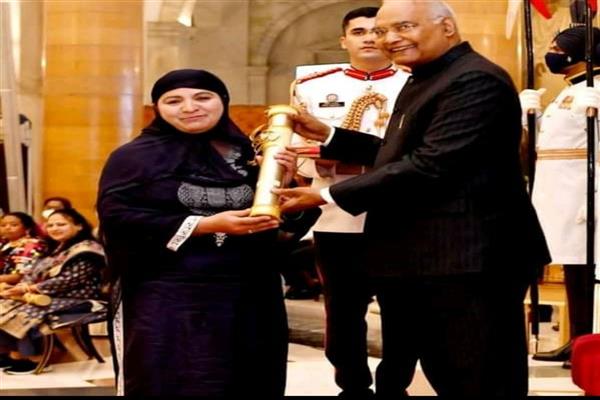On the eve of International Women’s Day, Nasira Akhtar, an innovator from Kashmir was awarded Nari Shakti Puraskar by President of India, Ram Nath Kovind in Delhi.
Hailing from Kanipura Kulgam, Nasira was awarded for her innovative idea of destroying polythene by discovering a herb and N.P.L which is used to convert polythene into ashes without causing any kind of environmental pollution.
She is the first Indian woman to convert polythene into ashes.
Born in 1972, it took her years to formulate the idea. She has been receiving a lot of appreciation and accolades.
She has made her place in Asia book of records, India book of records, Kalam book of records and much more.
Having studied till 10th class only, she struggled a lot while researching on her idea as there was no internet or references available to her for her help. “With minimum resources, I have researched. There was no laboratory and I have not studied further but it has all happened with the help of my Lord,” she said.
Nasira believes that she doesn’t need books to get ideas for innovations. “The universe is an open book. The one who studies it keenly always finds something,” she said.
Currently she is working in the Pollution Control Department. With her innovations, she had no idea what to do and where to go.
She said, “I was a housewife. People told me to visit some government departments. In the Pollution Control Department, there was PT Sharma who immediately offered me a job after meeting me.”
While talking about the struggles an innovator faces, she said that innovation is an easy thing but taking innovation to the market is a difficult task.
She said, “Innovator give new ideas and people are never ready to agree or accept the new things. Be it educated or uneducated, the innovator goes through a tough time. It’s very difficult to convince people about new things.”
Talking about societal response, she said, “If we look at the history of Kashmir, the verses of women like Habba Khatton, Lala Arifa have changed the society. I am not comparing myself to them. Problems always start from the family. They are not ready to agree with you and give you labels. I too had to listen all this but I never stopped,”
Grassroot Innovations Augmentation Network (GIAN) has provided her platform and supported her.
“Dr. GM Bhat and his staff supported me a lot. They are always at the forefront for innovators,” she added
She said that to achieve something, it depends on the emotions of a person.
“If they have skill and passion, then no one can stop them. A Sufi saint’s verse always reverberates in my head, ‘Mustaqil rehna hai lazim Ae Bashr tujko sada. Ranj wa Gham Yaas o Alam Fikr o Bala k samne.’ A person should be strong enough to take difficulties, sadness and worries,” she said.
After receiving the award, she still feels that she will be happy the day when the company will implement her idea. “I live or die, I want my work to go forward. I have not done it for myself. I have done it for the whole of humanity,” she said.
Currently, her two agricultural innovations are in process.
Anil Kumar Gupta, Indian scholar in the area of grassroots innovations, said that there is no lack of creativity in Kashmir. “The range of innovations to overcome the problems around is good in number. Kids also have innovative ideas there. All these years, despite having all the policy makers in place, these problems didn’t find any solution unless innovators came and gave us solutions.”
Citing the example of a Gurez innovator kid, Rafiq who had suggested that there should be a room in the village where all the old electrical goods are kept and used when in need. “The kid is making a policy for the country. Not just innovations but questions raised by children can also lead to big ideas,” he said.

